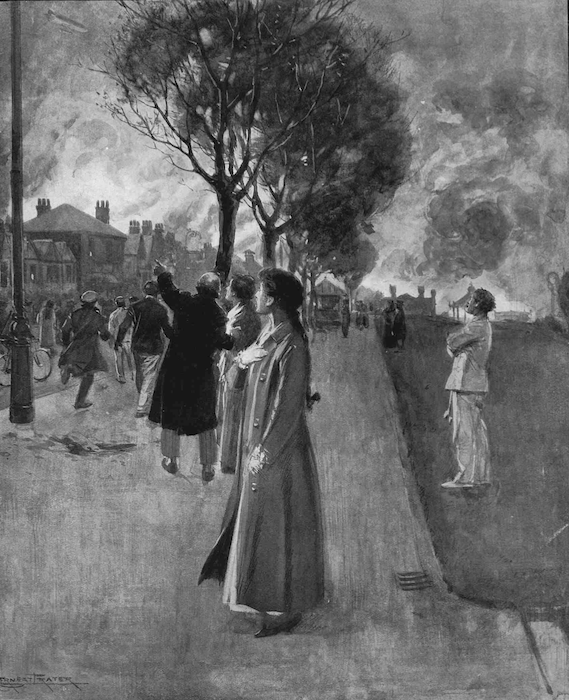
So I’m writing a book. Why? There are already many histories of the German air raids on Britain in the First World War: in my proposal, I listed eleven published since the 1980s alone, and even that is hardly exhaustive. Many of these are excellent — Ian Castle’s books, in particular, are required reading on this topic — and I would not add to the pile unless I felt I could add something original. So what will make Home Fires Burning different? Why should anyone want to read it? Here’s the (lightly-edited) rationale I gave in my proposal:
While Home Fires Burning will provide a narrative overview of the German air raids on Britain between 1914 and 1918, and place them in the context of the progress of the war both overseas and at home, it will go much further than that. No previous work on this topic has drawn on such a wide variety of contemporary sources, from newspapers and novels to rumours and insurance rates. Home Fires Burning will be the first accessible, yet rigorously-researched, book to provide a comprehensive analysis of this important part of British history. As such, it will provide a unique contribution to our understanding of the First World War.
Home Fires Burning is also methodologically original: it will be the first emotional history of bombing. It will pay as much attention to the emotional effects of the raids as their physical effects, which were admittedly tiny next to the casualties then being suffered on the Western Front and elsewhere, and small even compared to the losses during the Blitz a quarter of a century later. However, such purely quantitative comparisons belie the scale of the effects of the air raids on British society and culture more widely. Although the physical effects of bombs could destroy bodies and homes in mere seconds, their emotional effects on individuals, communities and the nation were ongoing, and complex. Reconstructing the emotional responses to air raids means trying to recover the trauma caused by the deaths of small children and elderly parents, as well as the conspiracy theories which people used to try to understand what was happening and what was going to happen next. It also means exploring how identity was built around the emotions of civilians in air raids, especially in the form of an emotional regime centred on ‘British pluck’, or stoicism, the precursor to the ‘Blitz spirit’ of the Second World War. Home Fires Burning will also draw on the history of the senses. Air raids, air defence and civil defence were all sensational spectacles which could be seen, heard and (often) felt far beyond the areas actually coming under attack, and so spread the emotional effects of bombing to spectators across cities and the nation. For most civilians this was their only direct experience of combat, creating a sense of participation in the war and of shared sacrifice with the men in the trenches, and placed them at the centre of the propaganda war over claims of German atrocities. Home Fires Burning will make full use of vivid and rarely-used primary sources, including newspapers, diaries, photographs, cartoons, rumour and conspiracy theories, to explain how the death and destruction inflicted on British civilians by German aircraft made them feel about the war, about the enemy, about their government, and about themselves.
Finally, the continuing centrality of the Second World War to twenty-first century British identity is clear, from ‘Keep Calm and Carry On’ and ‘London Can Take It’ to austerity, Brexit and now COVID-19. These ideas are rooted in the traumatic, yet proud experience of withstanding the Luftwaffe’s bombs in 1940 and 1941, when Britain supposedly stood alone against Hitler. Yet, this self-conception of Britons as possessing ‘British pluck’—what would later be called the ‘Blitz spirit’—was already evident during Britain’s first encounter with aerial bombardment. This stoicism was not, of course, innately British: indeed, it was precisely because it was feared that it was not a common trait that it was so valorised by the press. While trenches, poppies and shell shock remain key images of the Great War, the home front was just as much a forge of British identity as the Western front. Home Fires Burning will focus attention on the way that Britain’s first encounter with the bomber shaped what it has meant to be British, for better or for worse, and will also contribute to current conversations about Britain’s place in Europe and the world.
No book presently exists which can explain to both academics and engaged non- specialists how the German air raids of the First World War affected British society, and why they are still important. Home Fires Burning will be that book.
(Hopefully!)
Image source: Graphic, 15 May 1915, 609.
![]() This work is licensed under a Creative Commons Attribution-NonCommercial-NoDerivatives 4.0 International License.
Permissions beyond the scope of this license may be available at http://airminded.org/copyright/.
This work is licensed under a Creative Commons Attribution-NonCommercial-NoDerivatives 4.0 International License.
Permissions beyond the scope of this license may be available at http://airminded.org/copyright/.


Sounds good!
Also, uncannily timely
Heath:
Thanks!
Erik:
Possibly rather less timely by the time it sees the light of day…